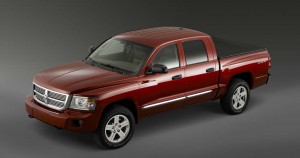To accommodate plans for a Dodge Dakota replacement under the new Ram truck brand, Chrysler is said to be considering a name change for its pickups, two sources have told our columnist, Mike Levine, who also serves as editor of PickupTrucks.com.
The current Ram truck line is split into the 1500 half-ton and 2500/3500 heavy-duty series. That naming scheme has been used since 1994, when the 1994 Dodge Ram 1500 was introduced with revolutionary styling that helped Dodge triple its share of the light-truck segment by 1998.
Chrysler dropped the Dodge name from its pickups last year in an effort to develop a stronger brand identity from its long-overshadowed line of Dodge cars.
(The decision to create an all-new Ram brand came, however, as a notable shift in direction in an industry that has, if anything, been trimming its brand count. General Motors, for one, sold or closed four marques following its bankruptcy, while Ford sold off all its foreign brands and announced plans to close laggard Mercury.)
In trying to figure out a new name for the Dakota successor under Ram trucks, Ram execs are said to have thought about two names: Ram 1000 and Ram 100. We’re told they’re leaning toward Ram 100 because it sounds better, but in doing so, Ram would also change all of the truck names to follow a similar naming convention. Ram 1500, 2500 and 3500 would be replaced by Ram 150, 250 and 350.
While that might seem like Ram is trying to find a free ride off Ford’s F-Series pickups, the best-selling line of full-size trucks, that’s not necessarily the case. Dodge’s 1981 – 1993 pickup line-up consisted of D150, D250 and D350 two-wheel-drive and W150, W250 and W350 four-wheel-drive models.
Would consumers welcome Ram 100, 150, 250 and 350 trucks?
“If the sales success of the F-150 is any indication of the importance or lack thereof of pickup truck nomenclature, ’150’ certainly does not mean less than 1500,” said Dave Sullivan, manager of product analysis at AutoPacific, an automotive consulting firm. “The Dakota name will most certainly not be missed, and bringing the Ram 100 name to consumers would further streamline the use of the Ram brand.”
We’re told by our sources that the Dakota replacement is best described as a 2011 Dodge Durango with a cargo box. It will share the same unibody platform, along with the Jeep Grand Cherokee.
While Dakota sales have consistently fallen year-over-year as the truck has aged along with other midsize pickups truck buyers haven’t embraced the notion of a unibody midsize pickup. Honda hoped to sell 50,000 unibody Ridgeline pickups per year when the truck came to market in 2005 for the 2006 model year, but in 2009 only 16,464 units were sold.
Chrysler will have to make sure its Dakota replacement is firmly associated with its more larger, more capable stable mates.
“The biggest advantage this could have for Chrysler/Ram is they would have a true pickup truck lineup, as many other OEMs have neglected their smaller offerings to focus on full-size pickups,” Sullivan said.
“The Ranger, Colorado/Canyon, Dakota and even the Japanese OEMs have neglected their smaller trucks in search of more profits. Ram could be positioning themselves for a winning lineup if/when gas prices spike again. This gives Chrysler a way to get more volume out of one platform without having to make a large investment on an all-new platform. The Grand Cherokee has impressive towing capability for a unibody vehicle and offers up a proven platform that is ripe to be transformed into a pickup.”
Our sources say that Chrysler has commissioned a market research company to see what truck buyers think of the all-new naming scheme.
Mike Levine is editor of PickupTrucks.com.


Well, considering Chrysler flatly denied any name-change discussions on their blog two hours, I’m inclined to take the additional notion of a Durango-based Dakota with a considerable helping of salt. They could have easily said nothing, or something like “We are continuing to investigate new opportunities for building the Ram brand”–but they didn’t.